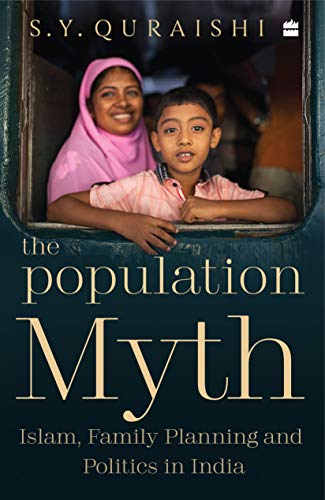Why I picked this book?
As we know there are various debates around the population of India. And various experts give various reasons of increasing population of India, primary among them is poverty, lack of education, lack of government support and investment in medical and family planning projects. Apart from these, one narrative that is hugely common is the population growth of Muslims and their aversion to family planning. There are so many theories and counter theories that it confuses you and you don’t get the real picture.
This book talks about the population and the various myths around it especially Muslims and their aversion regarding family planning and the politics around it. So, to know more and get some new insights I read this one.
The Book
The Population Myth – Islam, Family Planning and Politics in India takes you to the journey of family planning in India, which started right after the Independence. How it performed over the years? What were the challenges in implementing it ? Who opted for family planning? Family planning among Muslims in India vis a vis population policy among Islamic nations and the general attitude towards family planning among other major religions of the world.
India launched the National Family Planning Programme (NFPP) in 1952, becoming the first country to launch a plan nationally. The objective of the policy was ‘reducing birth rate to the extent necessary to stabilize the population at a level consistent with requirement of national economy.’
If this was case, then how and why we were not able to keep a check on our population? The Population Myth dig deep into it and with the help of census and other data tells us various facts about population growth of India. The important point being, despite the population increase the growth rate is steadily decreasing over the years.
The Population Myth also present an overview and analysis of the family planning Programme from its inception till recent times. How it has evolved over the years, what are the challenges faced in implementing it. The various socio-religious factors responsible for not using family planning methods. The role of literacy and poverty in population growth. The basic medical facilities available in villages for child delivery and pre-natal and post-natal care. The government policy, which was focused on sterilization rather than giving options to people and educating them, especially in rural India. There is lot of research-based data provided by the author to substantiate the above.
The Population Myth also dwells on Family Planning among Muslims, the common myths, and challenges in implementing the family planning. The socio-economic factors, the religious factor and other factor responsible for family planning or the lack of it among the Muslims. The author throws some light what Islam says about family planning and how it was/is interpreted by the Muslim religious leaders and how it is different from the general perception. It captures the views of renowned Imams on family planning, which will be interesting to read. The reader will get to know about the population control measures in the Islamic countries of the world.
Towards the end of the book the author provides details about the stance of major religions of the world on family planning and how they view it. How religion plays and guides people in taking a decision on family planning. And then he talks about the politics that is being played in the name of population in India. How a systematic approach is used to malign Muslims and how hate speech against them has become a norm.
About the Author
S.Y. Quraishi joined the Indian Administrative Service in 1971 and rose to become the seventeenth chief election commissioner of India. In October 2017, he was appointed ambassador of democracy by International IDEA (Institute of Democracy and Electoral Assistance), Stockholm, of which he is a board member.
Out Verdict
The Population Myth is a must-read book which provide evidence-based study of family planning and how various religions of India practice it. It breaks many general myths we have about our population and especially the myths around the Muslim population growth.
